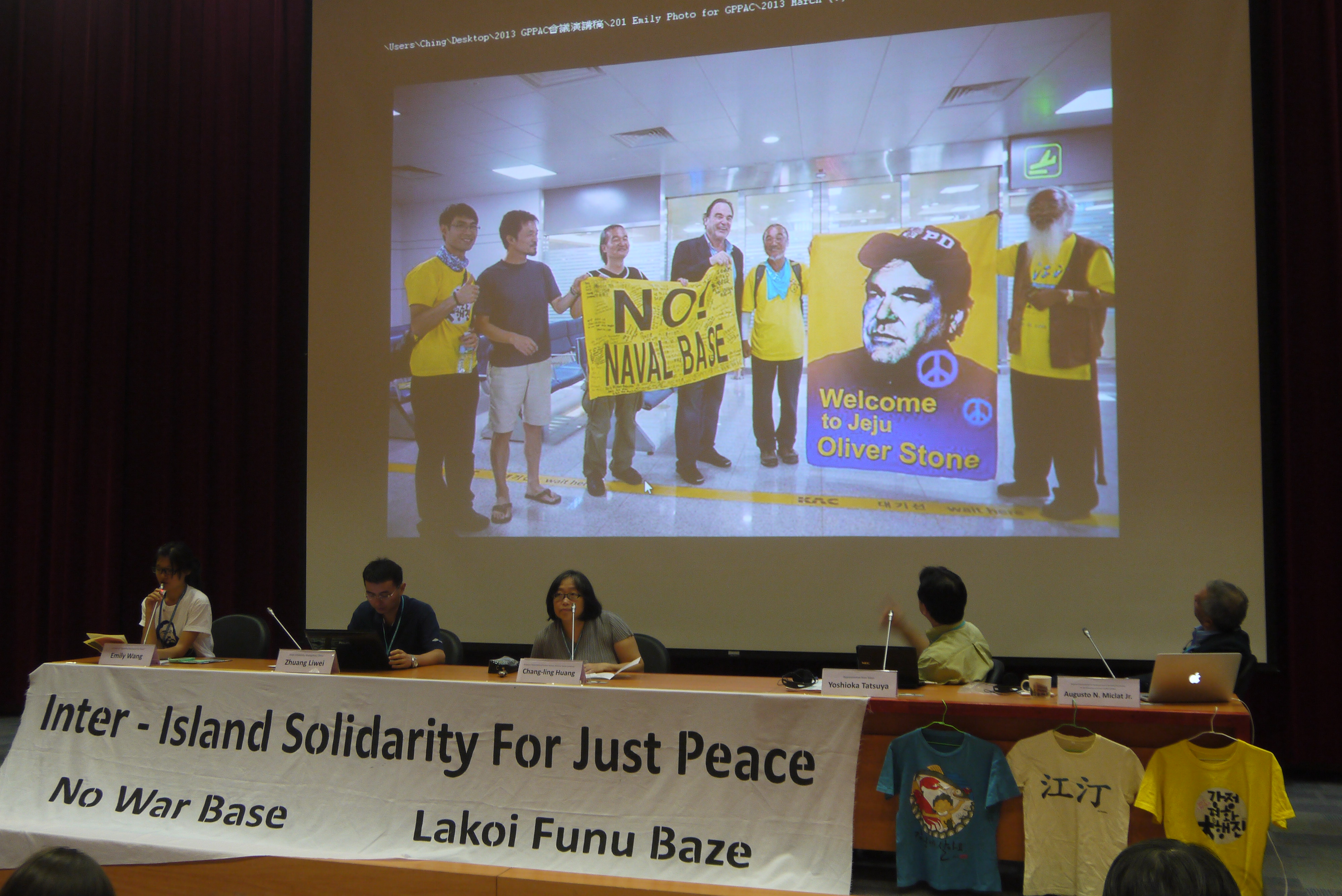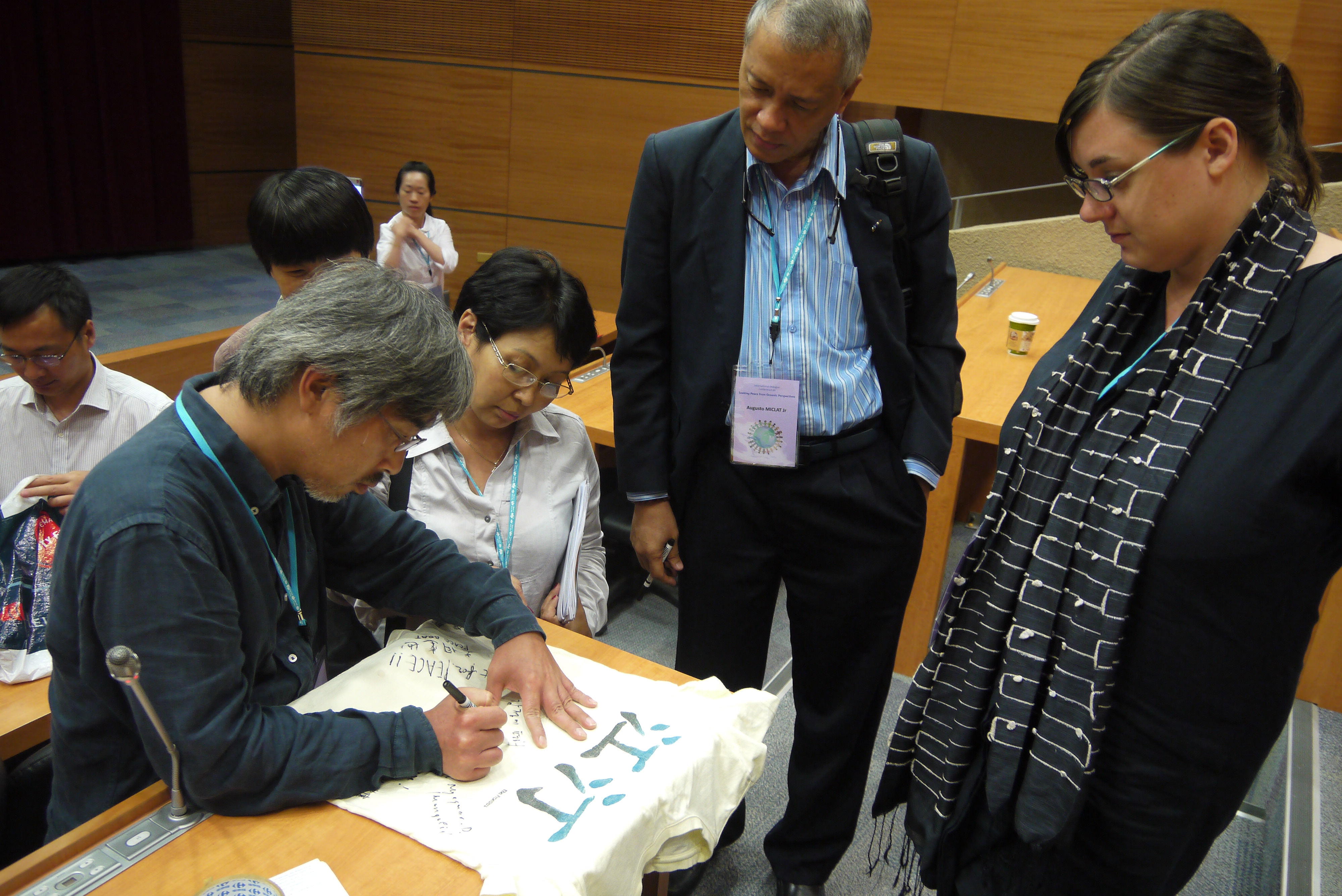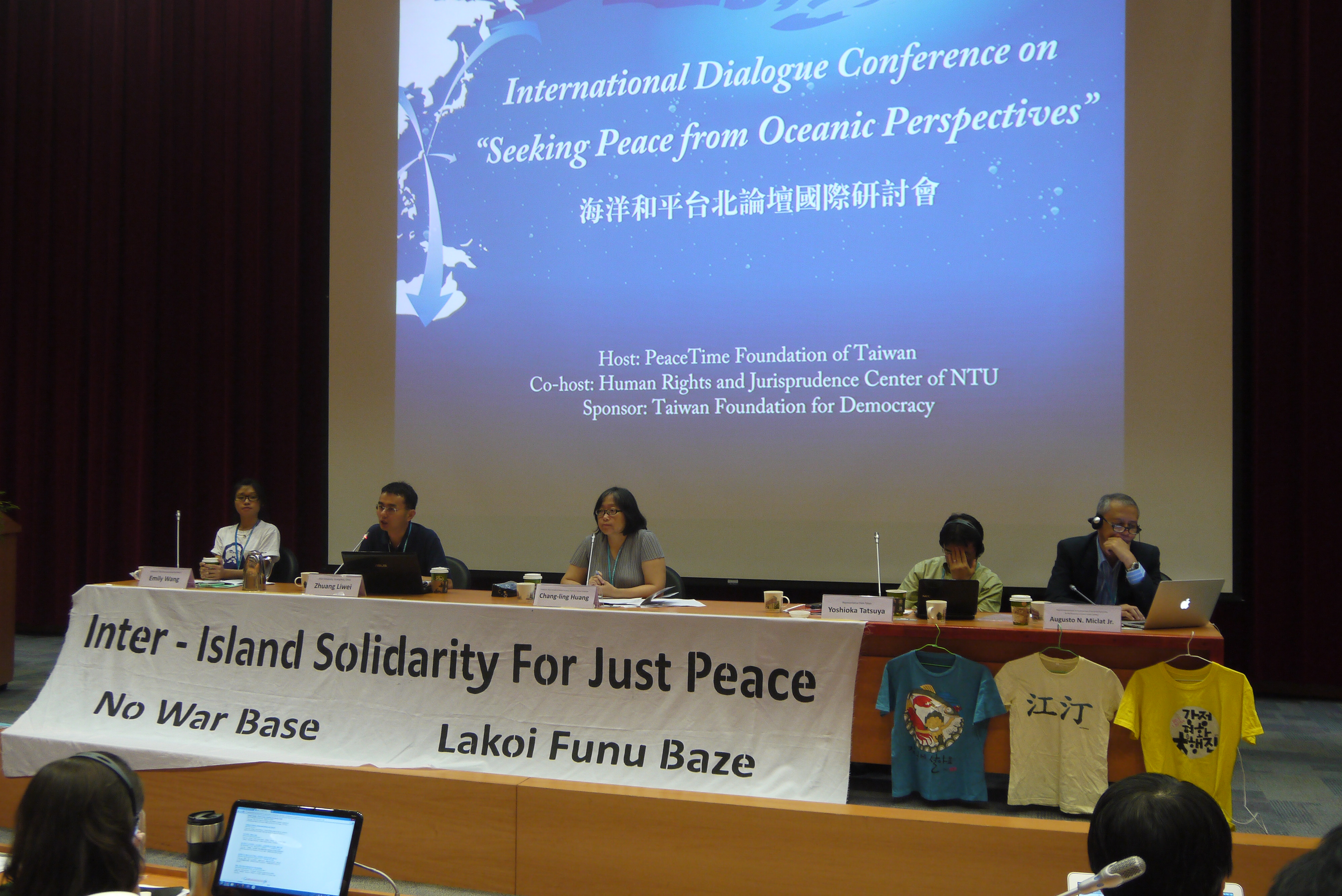On August 3rd, the International Dialogue Conference on “Seeking Peace from Oceanic Perspectives” was held in Taipei, Taiwan. Emily Wang was one of the speaker in the secession of “An Oceanic Deconstruction of Geopolitics” to share about Gangjeong and the idea of Inter-Island Solidarity for Just Peace.
The following is the speech draft of Emily Wang.
————–
By Emily Wang
My name is Emily Wang. I am an island peace activist from Taiwan Island and also I’ve ever lived and worked for peace on Timor Island for 1 year, and Jeju Island for almost 2 years, and I just got deported by the South Korea government in April 2013 due to my involvement in the Peace Movement in Gangjeong Village, Jeju Island where a major naval base is being built up. Thanks to the deportation, I got depressed for a while because I had to leave my friends and family. But also it gives me a chance to move forward in my next steps as an island peace activist.
Today’s topic is “An Oceanic Deconstruction of Geopolitics”. I would like to begin by sharing about “islands”, and I think the long suffering of many islands will provide an inspiring source to deconstruct geopolitics and for the peace in our region.
One of the crucial challenges of many peaceful and beautiful islands face is the trend of military expansion and militarization, largely by the U.S. Military. This has led to conflict, suffering, and environmental destruction in such places as Okinawa, Hawaii, Diego Garcia, Sprately Islands, Jeju (Korea), Guam, and others.
The situation which the islands face has been getting worse since the US launched the “Asia Pivot” strategy. Many islands are going to be further militarized, for example in North East Asia, Jeju and Okinawa. Besides Northeast Asia, there is other bad news to worry about. For example, The Philippines’ government now plans to invite back the US military they once kicked out to use their base again. The US is strengthening its partnership with these countries and following the strengthened partnership, these countries self-colonize themselves from the center to further marginalize and victimizes the small islands.
These islands are like “LilyPads” in the ocean used to allow military bases encircle the land to prepare for possible war in the future. Compared to a huge base, lots of small bases are spread across these lily pads, a strategy that is more flexible, attracts less attention, and allows for easier defeat of grass-roots resistance. In the past continuing until now, we have seen many islands face hardships in resistance due to the isolation of these small islands. Therefore, we need to develop inter-island solidarity for just peace among vulnerable islands and their peoples, for the protection of their lands, cultures, and traditions, as well as to find common strengths and resources for peace and just life. “Just peace” is our pursuit. We want to stop the current on-going militarization and while preparing other islands to prevent this possibility in advance. These struggles are not NIMBYs. One success shouldn’t come through another island being victimized.
I was a peace school teacher in Timor Island in the past, and recently I visited Timor again to share this idea of inter-island solidarity for just peace. During this visit, I heard that the US had a plan to use Timor-Leste’s Atauro Island for a base, while promising to build lots of infrastructure for this newly-independent country. So far, the government rejected, but this worry remains in my mind. Now, I am at the Northeast Asia GPPAC meeting, but I am also talking about another beloved island far away. These islands are too spread out, too small, and have so far mostly faced lonely struggles. I think especially for islands, we should not let national sovereignty divide the continuance of ocean.
In Northeast Asia, we dream of first starting with a Peace Island Triangle consisting of Okinawa, Jeju and Taiwan. What I mean by peace island is demilitarized peace islands. No bases, no militaries, no conscription, no state violence, and no domestic colonization or marginalization…
A long time ago, Jeju, Okinawa, and Taiwan were embraced by the ocean and developed unique cultures. Then influence and exchange came from the main lands or big islands. Mostly islands have been “marginal” places for the “center” of the main lands or big islands, but islands as their own center have gone on their own paths from generation to generation. Then western imperialism struck our region and most of the world. Still Islands often had distinct experiences from the main lands under imperialism.
Okinawa, Jeju, and Taiwan were colonized by Imperial Japan and become the stepping-stones for the expansion of Imperial Japan. In the final moments of World War Two, Imperial Japan further fortified these islands in expectation of invasion by the US Allied Forces, dragging these marginalized islands into the war as the frontline to protect the centers of power. It brought disastrous ground battles in Okinawa and air raids in Taiwan. Jeju was highly militarized through forced labor as well but following the battle in Okinawa, did not see war at that time. However they later faced the terrible extended 4.3 Massacre.
Due to the geographic location of the island, during Japanese colonization, perhaps 200,000 Jeju people at one time or another were moved back and forth between Jeju and Osaka, the foremost industrial city in Asia at the time. There they found jobs and, for some, better education than was allowed in Korea. Frequent ferries, some organized by Jeju transportation cooperatives, carried people to Osaka from eleven ports around Jeju. In Osaka, some Jeju residents were active in organized labor and Japanese socialist and communist organizations even in leadership positions. Some 60,000 people returned from Japan to Jeju within a short time of the Japanese surrender in August 1945. The experienced and educated returnees played an important leadership role in the emerging governmental structures on Jeju.
However, soon the division of the Korean Peninsula by the United States and the Soviet Union turned Jeju into a battlefield for subsequent cold war conflicts on the peninsula. In 1948, with U.S. and U.N. support, South Korea held elections that established a separate state in the south, thus solidifying Korea’s division. When the US tried to install a Pro-US government in the south with a separate election, the Jeju people bravely stand up to protest and boycott this election and the division of Korea. When U.S. backed leader Syngman Rhee took power following the elections, he initiated a massive “Red” cleansing campaign targeted the Jeju general population. Thousands of people were killed. It is estimated that 70 percent of entire island’s villages were razed to the ground and 30,000 people—ten percent of the island’s population—were murdered.
For years, any mention of the massacre could lead to imprisonment and torture. Relatives of those who had been labeled as Communists were prevented from taking public service positions or jobs in many companies. Many are still afraid to talk about what happened. For 50 years, successive governments in Seoul silenced the Korean people’s memories of systematic murder, rape and torture. It was not until 2006 that the late President Roh Moo-Hyun officially apologized for the massacre and designated Jeju “Island of World Peace”. As one exits the Official 4.3 Peace Park Museum, a sign reads: “The Jeju April 3rd Incident will be remembered as a symbol of the preciousness of peace, unity and human rights.” But the government’s memory is short. Plans for a major naval base on Jeju had been in the works since 2002 at different locations, but opposition from local residents’ halted construction several times. The struggling of the islanders to defend their lives, lands, community is again leading to them being painted as “Reds”.
This sad history once led the people to dream of making this island a Peace Island, but we realized that without continuous non-violent efforts to realize this goal and to carry on peace education, even the islanders themselves can erase these precious memories through public education and mainstream media. Also, we learned that without walking together with the international community, our peace cannot be a just peace.
I am an islander. I’ve talked much about the victimization of islands but it is not because I hate people from mainlands or big islands and I don’t deny the suffering of mainlanders as well. The reason that I promote island peace building is because I want to build peace as who I am. Actually, my island, I mean Taiwan, itself is also a “big island” which marginalizes and victimizes smaller islands like Lanyu, where our government shamefully secretly throwsaway nuclear waste. Unlike Okinawa, Jeju, and Taiwan which have relatively long histories through the storms of power-shifting between surrounding powers, Lanyu had long been a self-governed island without interruption from outside until its colonial encounter with Imperial Japan and the Chinese Nationalist government. Social activism on the Island began from the suffering of this small island. I expect Lanyu, the Chinese name, or Ponso no Tao, as its called by its indigenous islanders can become a light to connect Taiwan to the Peace Island Triangle.
Only if peace and justice become a common goal among us, can we break our current boring and rigid situation, and blossom our creativity through peace-building.
The suffering islands are our hope. We should hold hands together with these islands regardless if you are foreigners or mainlanders. I want to emphasize that talking about Islands and Islanders is not to make division. I just want to remind us that there are some people who are embraced by the ocean but sadly this embrace by the ocean turned into the isolation by the ocean. These are issues that we should face together. I hope that islands will not only again be embraced by the ocean but also be embraced by the surrounding big lands.
I truly hope we don’t make a stupid fake peace in our region by holding hands with the US while refusing to face the historical issues that caused our region to become one of the most militarized in the world. There are many things we islanders can do as we dig through the layers of our history and seek to find a common future peace across the ocean, between the islands within it.
Thank you for listening.








